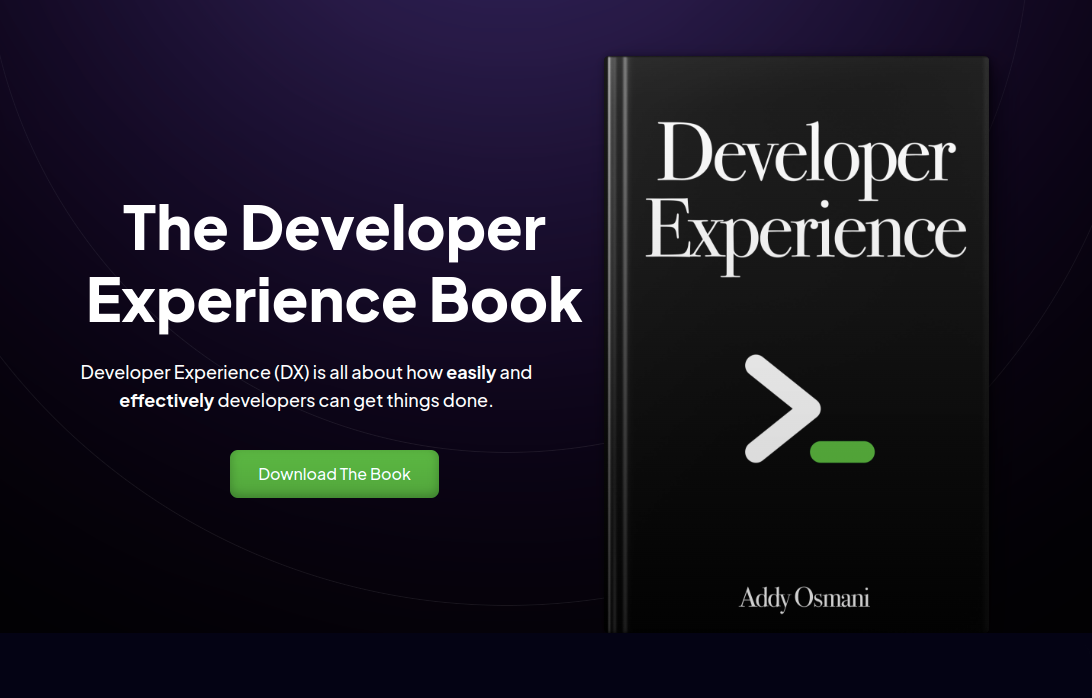Developer experience by Addy Osmani

Developer Experience (DX) is not just a buzzword tossed around at conferences; it's a crucial aspect of software development that significantly influences how developers author, maintain, and test software. Addy Osmani, a prominent figure in the development community, has recently penned a book on DX, providing valuable insights that can reshape how we approach software development. In this blog post, we'll delve into the key takeaways from the book and explore the principles, metrics, and strategies that contribute to a seamless DX.
First Impressions
Addy Osmani's book on DX is not only a compelling read but also freely accessible on the internet, making it a valuable resource for developers. With around one hundred pages, it offers succinct yet powerful insights that can be immediately applied in the enterprise software development landscape.
Key Takeaways
-
Core of DX:
- DX revolves around how easily and effectively developers can accomplish tasks.
-
DX vs. UX:
- Good DX shares similarities with good User Experience (UX).
- Components include understanding developer needs, designing intuitive tools, providing high-quality documentation, and fostering support and community engagement.
- Success metrics involve surveys, quantitative metrics, and productivity gains.
-
Qualitative and Quantitative Metrics:
- Metrics span usability, accessibility, findability, credibility, usefulness, value, and sentiment analysis.
-
First Principles of DX:
- Embrace principles like speed, minimal friction, incremental steps, hands-on learning, and prompt issue resolution.
-
Developer Tool Evaluation:
- Developers assess tools based on APIs, documentation quality, development speed, production readiness, architectural understanding, ecosystem maturity, and debugging ease.
-
Quick Tips:
- Prioritize error management.
- Emphasize speed.
- Market effectively.
-
Effective Error Messages:
- Good error messages identify the problem, its cause, and the solution, unblocking developers in the process.
-
Real-time Feedback:
- Provide feedback as developers type to preemptively address runtime or compilation errors.
-
UX and First Impressions:
- Positive experiences involve quick installation, rapid problem resolution, comprehensive APIs, and efficient information retrieval.
-
DX Mindset:
- Establish a DX vision and principles.
- Measure DX success.
- Implement DX in tools and journey maps.
- Continuously refine and improve DX maturity.
-
Implementation Strategies:
- Focus on the first five minutes and the solid 100th day.
- Aim for zero friction and high speed.
- Leverage build automation and opinionated tooling.
- Engage in understanding developer needs.
-
Developer Relations (DevRel):
- Take DX to the community.
- Act as the first customer to validate APIs and libraries.
- Listen to community feedback and address questions.
- Create comprehensive documentation, samples, and blog posts.
- Manage local and online communities through active interactions.
-
Types of Developer Journeys:
- Frequent and important journeys.
- Infrequent yet crucial journeys.
-
DX Journey Touchpoints:
- Discover: Utilize social platforms, events, blogs, newsletters, and case studies.
- Evaluate: Prioritize a well-designed docs landing page and FAQs.
- Learn: Provide quick start guides, code samples, and tutorials.
- Build: Offer sandboxes, reference guides, and change logs.
- Scale: Focus on developer success and showcase implementations.
Conclusion
In conclusion, Addy Osmani's concise book serves as a thought-provoking summary that ignites the discourse around DX. As the software development landscape continues to evolve, embracing a DX-focused mindset and implementing the strategies outlined in this book can pave the way for a more efficient and enjoyable development experience. The fire of DX has been lit, and it's poised to spread across the development community.